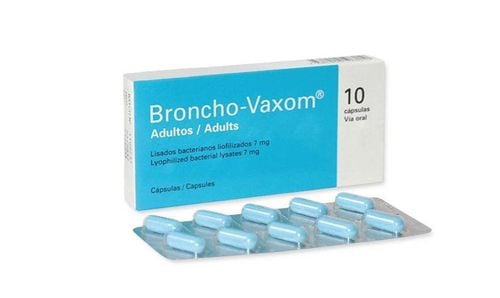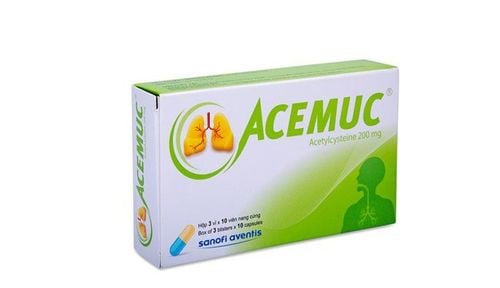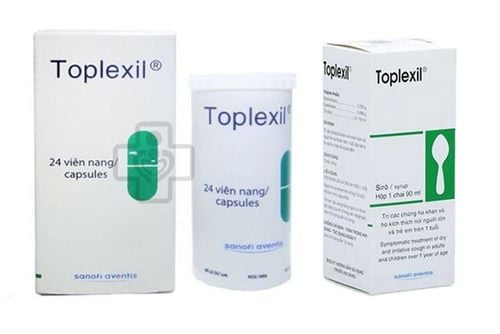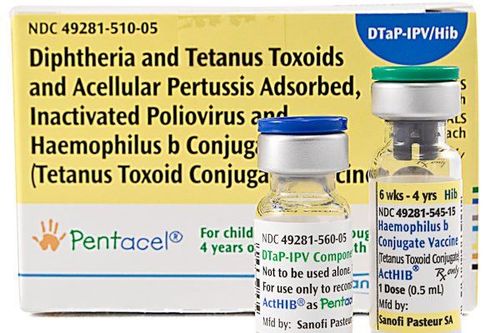This is an automatically translated article.
Antituss plus is indicated for use in the treatment of coughs caused by flu, colds, whooping cough or respiratory infections. Each bottle of Antituss plus contains many different cough suppressants, but there may be some potential side effects. Therefore, patients need to adhere to the correct dose and frequency recommended by the doctor.
1. What is Antituss plus?
Antituss plus medicine belongs to the group of cough and cold medicines, used only by prescription of a doctor. Antituss cough medicine is prepared in the form of syrup, with packaging specifications of 1 bottle x 60ml. Each bottle of Antituss syrup contains the following main ingredients:
Main active ingredient: Dextromethorphan hydrobromide 60mg. Chlorpheniramine maleate 15.96mg. Guaifenesin (Glyceryl guaiacolate) 600mg. Sodium citrate dihydrate 1596mg. Other excipients are sufficient.
2. Indications and uses of Antituss plus
2.1 Indications for use of Antituss plus Cough medicine Antituss plus is usually indicated for use in the following cases:
Treatment of coughs caused by influenza, colds, whooping cough, measles, mild irritation in the throat, bronchi or by inhalation of irritants. Relieves cough caused by respiratory infections, such as pneumonia, bronchitis, pneumonia - bronchiolitis, laryngitis, pharyngitis, tracheobronchitis, tracheitis. 2.2 Uses of Antituss plus Each active ingredient in Antituss plus has a cough-reducing effect according to its own mechanism, specifically:
Dextromethorphan : Able to reduce cough by acting on the cough center in the onion. Brain. Guaifenesin: Has expectorant effect to reduce cough by stimulating secretion of secretions in the digestive tract. Chlorpheniramine: belongs to the group of antihistamines, effective in treating allergic cough.
3. Dosage, administration, treatment of overdose and missed dose of Antituss plus
3.1 Dosage and administration of Antituss plus Antituss plus cough medicine is prepared in the form of a syrupy solution, so the drug should be administered orally with the correct dosage. The dosage of Antituss plus as prescribed by the doctor is specifically determined as follows:
Children < 2 years old: Take Antituss cough syrup according to the dose recommended by the doctor. Children from 2 to 6 years old: Take 5ml Antituss / time x 2 - 3 times / day. Children from 6 to 12 years old: Take 10ml of Antituss / time x 2 - 3 times / day. Children > 12 years old and adults: Take 15ml Antituss / time x 2 - 3 times / day. 3.2 What to do if you miss a dose or take an overdose of Antituss plus? When you miss a dose of Antituss plus
The patient should take the missed dose as soon as possible. Skip the missed dose if it is almost time for your next dose. Instead, use your next medication as planned. Never take a double dose or take a double dose. In case of overdose of Antituss plus, patients may experience symptoms of an overdose of Dextromethorphan, such as blurred vision, urinary retention, nausea, vomiting, nystagmus, and nystagmus. , respiratory failure, convulsions or hallucinations. In addition, chlorpheniramine-related overdose symptoms may also occur, including psychosis, arrhythmias, cardiovascular collapse, sedation, seizures, apnea, convulsions, anti-acetylcholine secretion, or paradoxical stimulation. usually central nervous system.
In case of accidentally taking an overdose of Antituss plus and experiencing serious side effects, the patient should immediately go to a medical facility or notify the doctor for appropriate treatment. Depending on the situation of drug overdose, the doctor will offer a suitable solution, specifically:
Treatment of overdose related to Dextromethorphan: Using Naloxone 2mg intravenously, the patient can be given prompts. Repeat if necessary for a total dose of up to 10 mg. Treatment of overdose related to Chlorpheniramine: The doctor will treat the overdose symptoms that the patient is experiencing, support vomiting with ipecacuanha syrup or gastric lavage. To limit the absorption of drugs in the body, the doctor may give the patient bleach and activated charcoal. In case of symptoms of arrhythmia or hypotension, the patient should be treated aggressively. Seizures can be treated with intravenous Phenytoin or Diazepam. If the patient has symptoms of severe overdose, a blood transfusion may be required.
4. Antituss plus side effects
During treatment with Antituss plus cough medicine, patients may experience some of the following side effects:
Common side effects: Sedation, tachycardia, somnolence, fatigue, flushing skin, nausea, vomiting, abdominal pain, dry mouth. Uncommon side effects: Urticaria, increased blood uric acid levels, mild intestinal cleansing or metabolic alkalosis in patients with renal failure. Patients should notify a qualified physician if any of the side effects listed above are present. Delayed detection and treatment of side effects can lead to other dangerous consequences for the patient's health.
5. Things to keep in mind when using Antituss plus
5.1 Contraindication to using Antituss plus cough medicine As recommended by experts, the following subjects absolutely do not arbitrarily use Antituss cough medicine without a doctor's prescription, including:
Patients with are allergic to Dextromethorphan, Guaifenesin or to any other active ingredient in the drug. The patient has received or is receiving treatment with a monoamine oxidase inhibitor (MAOI) within the previous 14 days. Antituss plus is contraindicated in patients with acute asthma attacks. Patients with symptoms of prostatic hypertrophy, bladder neck obstruction, narrow-angle glaucoma, pyloroduodenal obstruction or gastric ulcer. Antituss plus should not be used by people with severe kidney failure. The patient has fluid retention or hypernatremia. Antituss plus should not be used by pregnant women, nursing infants or premature infants. 5.2 Precautions to be taken during the use of Antituss plus When treating cough and cold symptoms with Antituss plus, patients need to be cautious of some of the following:
Active ingredient Chlorpheniramine in the drug can lead to urinary retention due to the anti-acetylcholine effect. This requires particular care in patients with urinary tract obstruction, prostatic hypertrophy, myasthenia gravis, or pyloroduodenal obstruction. When using alcohol and other sedatives during treatment with Antituss plus can increase the sedative and drowsy effects of the active ingredient Chlorpheniramine. People with chronic lung disease, shortness of breath, shortness of breath, productive cough, chronic cough (smokers), emphysema, asthma, at high risk or in respiratory distress, children < 2 years old Caution should be exercised when treating with Antituss plus. Use caution when using Antituss plus for elderly patients (over 60 years old) because these subjects are often sensitive to the anti-acetylcholine effect of the drug. The active ingredient Dextromethorphan in the drug can stimulate the release of histamine, so it should be used with caution in pediatric patients with a history of allergy or hypersensitivity. There is a risk of abuse or dependence on Dextromethorphan, especially when patients take the drug at high doses for a long time, but this is quite rare. Avoid using Antituss plus in patients with glaucoma (eg, glaucoma). Antituss plus can cause dizziness, blurred vision, somnolence, dizziness or psychomotor impairment, so people driving vehicles, operating machinery should be careful when taking this medicine. 5.3 Interactions of Antituss plus with other drugs Antituss plus may have an interaction reaction when used with the following drugs:
Muscarin inhibitors. Central nervous system depressants. Tricyclic antidepressants. Alcohol. Taking Antituss plus with these substances or drugs may increase side effects or decrease how effective the medicine is. To ensure safety and avoid interactions during treatment with Antituss plus, patients should inform their doctor about the list of medicines, supplements, herbs or health-protecting foods that they are taking as well as other medical conditions. Your doctor can advise you to adjust the time between medications or substitute a more suitable alternative.
Please dial HOTLINE for more information or register for an appointment HERE. Download MyVinmec app to make appointments faster and to manage your bookings easily.













